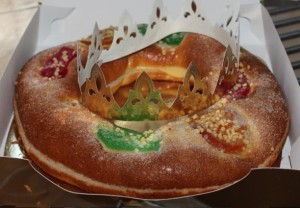
Happy Epiphany or Kings’ Day to those celebrating today. I mention it because it was an important day in the Tudor calendar. Alison Sim, in her excellent book “Pleasures and Pastimes in Tudor England”, writes:
“The most sumptuous feast of the year was 6 January, Twelfth Night, which was also the feast of the Epiphany and so the day started with a church service, but it would end with some form of feasting and entertainment. At the court the King wore his full royal robes and crown, and often an elaborate masque or similar entertainment would take place.”
Of course, on 6th January 1540 Henry VIII was also having a sumptuous banquet to celebrate his marriage to his fourth wife, Anne of Cleves.
Epiphany, in Western culture, is the feast day celebrating the visitation of the Magi to baby Jesus. Here in Spain, children leave out their slippers or shoes on the night of 5th January for the Three Kings to leave them presents. If the children have been naughty, a piece of coal (which is actually coloured sugar these days!) is left for them. In our village, and in many communities around Spain, the Three Kings actually process around the village on the night of the 5th, throwing sweets to the crowd and then giving out presents to the children. Here are some photos that Tim took last night:
[slideshow id=524 w=400 h=400]
Today, we start our Roscón de Reyes (Kings’ Cake), a cake in which a bean and a King figure are hidden. Whoever finds the bean has to pay for the cake and whoever finds the King is crowned King of Epiphany, with the paper crown that comes with the cake, and will have luck for the year. Our Roscón is pictured at the top of this post.
Happy Kings’ Day!